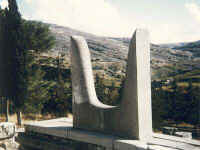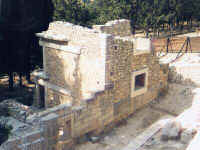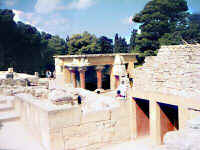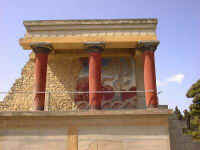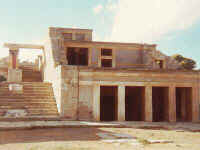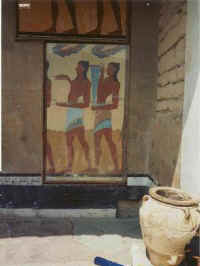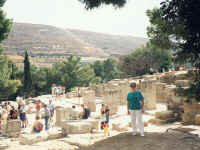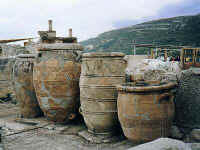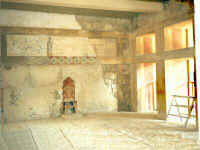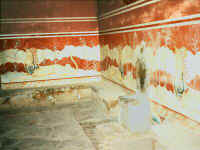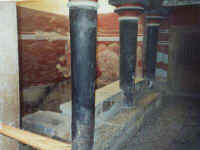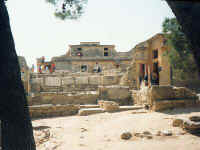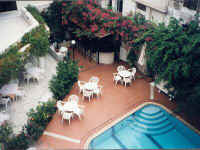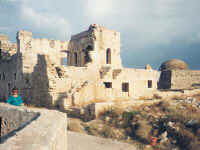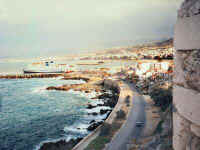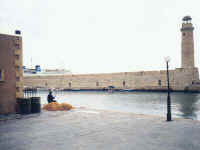|
Page 1 2 3 4 5 6 7 8 9 10 11 12 13 14 15 16 17 18 19 20 21 22 23 Wednesday, October 11: Although we would have preferred to sleep late our first morning in Crete we had to get up at 7:00 because we wanted to get to Knossos before it got too crowded. Breakfast at the hotel was buffet style, all-you-can-eat. There were boiled eggs, sliced cheese and sausage, regular bread, sweet bread, cookies, juice, and coffee. I found a travel agent right across the street from the hotel and booked a cabin on the Saturday ferry to Piraeus. (As we had learned on our previous visit to Crete, you can't book a ferry out of Crete until you arrive there.) The weather was quite pleasant for a change. We got to Knossos about 9:30. Not knowing exactly how far we were from the ruins, we drove past half a mile string of people trying to wave us into their yards to park for a fee. We past the entrance and, by dumb luck, found a parking spot in the free public lot right next to it. The site was already full of tour groups, but at least there was no line to buy tickets. Perhaps there had been a little more restoration on the periphery than when we'd visited 22 years before, but the site looked pretty much as we remembered it. The big difference was in the crowds of people this time. We had the place to ourselves in 1973. Knossos was the center of the first civilization in Europe, the Minoan. It was already occupied before 6000 B.C. The Minoans were the preeminent power in the region for over 1000 years until they were invaded by Greeks from the mainland about 1450 B.C. The first palace at Knossos was begun around 2000 B.C. and it was destroyed by an earthquake about 1700 B.C. It was promptly replaced by the second palace. When the Greeks invaded, they burned the Minoan palaces at Phaistos, Malia, and Zakros, but occupied the one at Knossos. Nevertheless, that palace was destroyed by fire about 1400 B.C. The ruins visible today are the remains of the second palace (1700 B.C.). The palace was an architectural marvel, a two to five story high split-level structure covering over 200,000 square feet. It had hundreds of rooms, running water piped in from a mountain six miles away, drainage systems, and a flush toilet in the queen's chambers. Even the interior rooms had natural light from light shafts. It is more enjoyable to tour than most ruins because of the imaginative (and controversial) reconstructions added during the excavation. By the time we finished our tour, around noon, there was a long line of people waiting to buy tickets. We headed for Rethimno, 50 miles to the west. (We were saving Iraklion, including the Archeological Museum, for our last day when we had to be there anyway to catch the ferry.) We took the "new road," an excellent modern road and a great improvement over the old one that twists around every hill and goes through the center of every village. It was a pretty drive along the north coast. We were hungry by the time we reached the beach area east of Rethimno, so we stopped at one of the many seaside restaurants for souvlaki. There were quite a few people in the water, mostly standing and facing the big waves coming in.
In Rethimno we drove along the waterfront, parked, and walked around some. We had
hoped to get a waterfront hotel, but they all looked a bit seedy. Back in the car, we finally found
the Hotel Fortezza, a category B, definitely the nicest hotel of our trip. Our
room had a balcony overlooking a pretty courtyard with a small swimming pool. It was
surrounded by pretty flowers, and there were about a dozen bird cages scattered around. One
canary would start singing, and all the others would join in. The only drawback was a German
shepherd barking on the roof of an adjoining building. The hotel was a short block from the Venetian fortress on the west end of the small
peninsula that constitutes the old town center. We toured the fortress, the largest the Venetians
ever built. (It took the Turks 21 months to capture it in 1645.)
The entire center of the city is Venetian architecture. Except for a couple of minarets added by the Turks, it's almost like being in Italy. We walked around town some more, then returned to the hotel around 5:00, enjoying our balcony and the pleasant weather. We waited until it got dark to go out because we wanted to see the town at night. With the sun gone, though, it was chilly and windy along the sea. The small Venetian Harbor with its tiny lighthouse was charming. The walls of the fortress were also illuminated. We ate at the Famagusta, an excellent choice. We had a lemon chicken rice soup, cordon blue (Jane), curry chicken (me), beer, and cappuccino. Back at the hotel around 9:00, we found the gift shop open. We only went in out of curiosity, but we ended up buying four items. Surprisingly, the prices were lower than we'd seen anywhere else. We sat on the balcony again. It was a beautiful setting, and the night was mild in that protected space. We actually stayed up until 11:00. The rest of our trip was to be at a more relaxed pace. Page 1 2 3 4 5 6 7 8 9 10 11 12 13 14 15 16 17 18 19 20 21 22 23 |

